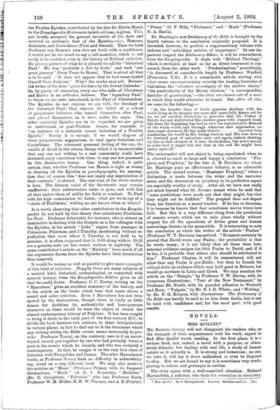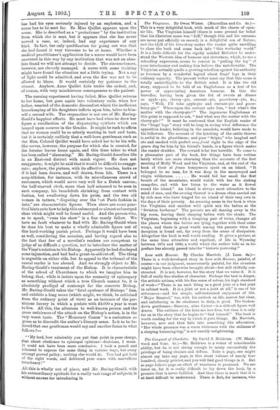NOVELS.
MISS QUILLET.*
Mn. BAnneo-GouLn will not disappoint the readers who, on the strength of their acquaintance with his work, expect to find Miss Quaid worth reading. In the first place, it is a serious book, not, indeed, a novel with a purpose, or obtru- sively didactic, but dealing with real life, a study of human nature as it actually is. It is strong and humorous ; no one, we take it, will lay it down unfinished or even be disposed to skip. But we are bound to say it is sometimes very crude, glaring in colour, and grotesque in outline.
The story opens with a well-contrived situation. Richard Marmaduke, a solicitor, who finds his recreation in chemistry,
Miss Quit/et. By S. Baring.Gould. London : Methuen and Co. Gs.1
has had his eyes seriously injured by an explosion, and a nurse has to be sent for. So Miss Quillet appears upon the scene. She is described as a " probationer " by the institution from which she is sent, but it appears that she has never nursed a case, or, indeed, had any experience of any kind. In fact, her only qualification for going out was that she had found it very tiresome to be at home. Whether a medical practitioner's application for a nurse would have been answered in this way by any institution that was not an abso- lute fraud we will not attempt to decide. The circumstances, however, are cleverly managed. A nurse with some training might have found the situation not a little trying. Not a ray of light could be admitted, and even the fire was not to be allowed to blaze. It would certainly try patience to the utmost. Anyhow, Anne Quillet fails under the ordeal, and, of course, with very mischievous consequences to the patient.
The nursing experiment having failed, Miss Quillet returns to her home, but goes again into voluntary exile, when her father, wearied of the domestic discomfort which the inefficient housekeeping of his daughters inflicts upon him, takes to him- self a second wife. The stepmother is not one of Mr. Baring- Gould's happiest efforts. He must have had when he drew her figure a recollection of the disparaging epithets which are heaped upon noverca in the Gradus. It might be rash to affirm that no woman could be so utterly wanting in tact and taste, but it is certainly unlikely that a well-born gentleman such as the Hon. Colonel Quillet would have asked her to be his wife. She serves, however, the purpose for which she is created, for the heroine leaves home again, and this time takes to what has been called "slumming." Mr. Baring-Gould describes life in an East-end district with much vigour. He does not exaggerate; it might be said that it would be difficult to exagge- rate; anyhow, the picture, with its effective touches, looks as if it had been drawn, and well drawn, from life. There is a soup-kitchen, for instance, with its miscellaneous crowd of customers, which would serve very well for a Dutch canvas; the half-starved clerk, more than half ashamed to be seen in such company, his _broadcloth shrinking from contact with fustian, but swallowing down his pride, and the two old women in tatters, "disputing over the list Paris fashion in hats," are characteristic figures. Then there are some prac- tical hints as to how to help this submerged or almost submerged class which might well be found useful. And the parson who, so to speak, "runs the show" is a fine manly fellow. We have no fault whatever to find with Mr. Baring-Gould when he does his best to make a wholly admirable figure out of this hard-working parish priest. Perhaps it would have been as well, considering the occasion, and having regard also to the fact that few of a novelist's readers are competent to judge of so difficult a question, not to introduce the matter of the Vicar's relation to his Bishop. Apparently he bad disobeyed some injunction, and had had a grant-in-aid cutoff. The thing is arguable on either side, but to appeal to the tribunal of the casual reader is too absurd. And we strongly object to Mr. Baring-Gould's treatment of the Bishop. It is characteristic of the school of Churchmen to which we imagine him to belong, that, while it insists upon the necessity of episcopacy as something without which a true Church cannot be, it is absolutely prodigal of contempt for the concrete Bishop. Mr. Baring-Gould takes the "fatal opulence of Bishops" line, and exhibits a long menu (which might, we think, be criticised from the culinary point of view) as an instance of the per- nicious luxury in which a prelate with 24,000 a year is wont to live. All this, the allusions to well-known person and the gross unfairness of the attack on the Bishop's action, is in the very worst taste. The "Honorary Canon" is a caricature so gross as to discredit the author's literary sense. Is it to be be- lieved that one gentleman would say and another listen to what follows ?—
. My lord, how admirably you put that point in your charge, .that about obedience to episcopal opinions—decisions, I mean. It could not have been more conclusive. I took a pencil and laboured to express the same thing in various ways, but every attempt proved paltry; nothing else would do. You had got hold of the right words, and delivered your sense with marvellous trenchancy."
411 this is wholly out of place, and Mr. Baring-Gould, with his extraordinary aptitude for a really vast range of subjects, is without excuse for introducing it.







































 Previous page
Previous page